Organizational Behavior Concepts: Culture, Motivation & Team Dynamics
VerifiedAdded on 2023/06/10
|12
|4648
|477
Report
AI Summary
This report analyzes organizational behavior, focusing on the influence of organizational culture, politics, and power on individual and team behavior and performance. It evaluates content and process theories of motivation and motivational techniques for effective goal achievement. The report also examines the characteristics of effective teams and applies organizational behavior concepts to a given business situation. Key topics include Maslow's hierarchy of needs, Alderfer's ERG theory, and McClelland's achievement motivation theory, with a critical evaluation of how these theories influence behavior. The analysis emphasizes the importance of a positive organizational culture, effective leadership, and employee motivation for achieving organizational goals and sustaining a competitive advantage. Desklib offers a platform for students to access similar solved assignments and study resources.
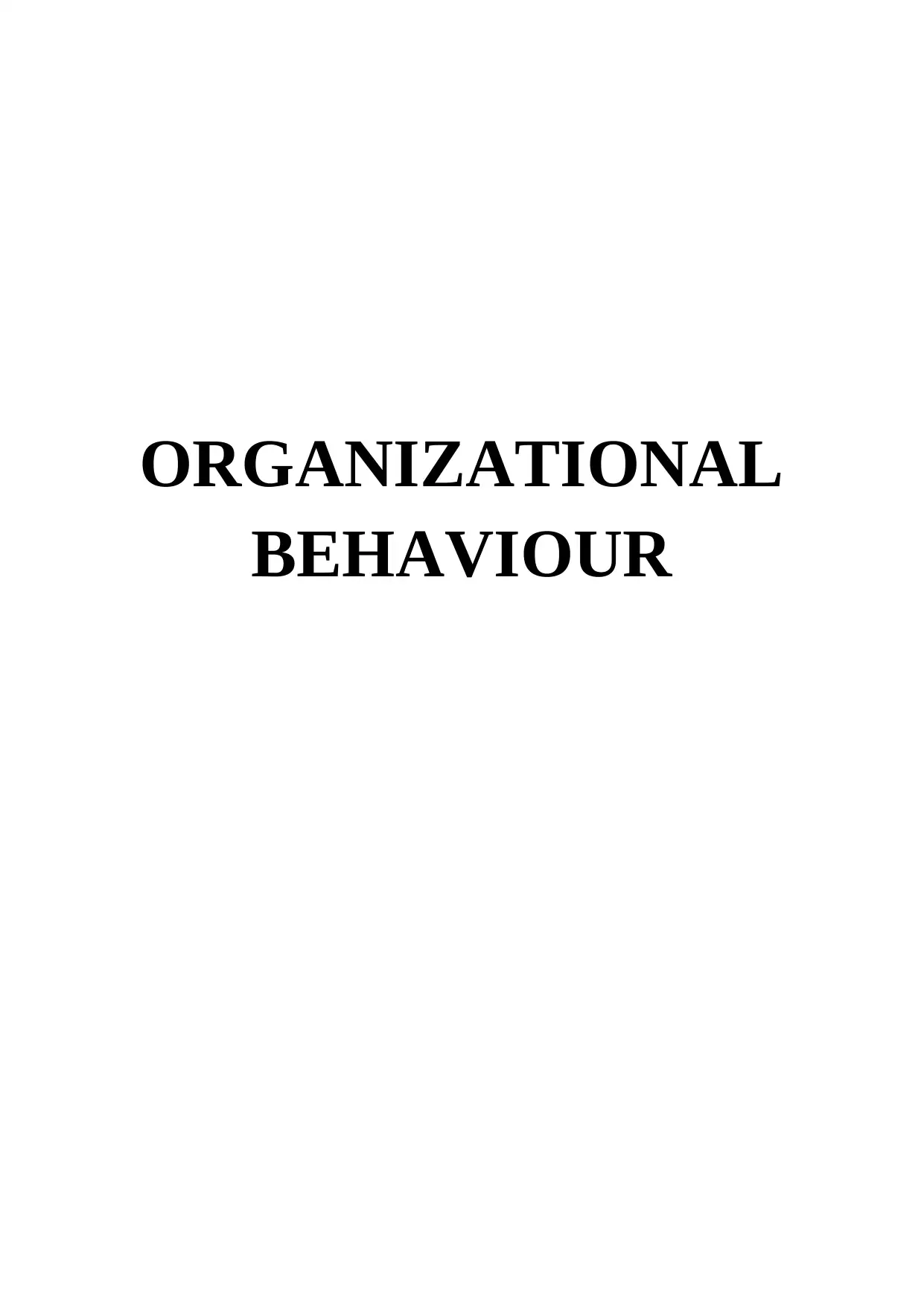
ORGANIZATIONAL
BEHAVIOUR
BEHAVIOUR
Paraphrase This Document
Need a fresh take? Get an instant paraphrase of this document with our AI Paraphraser
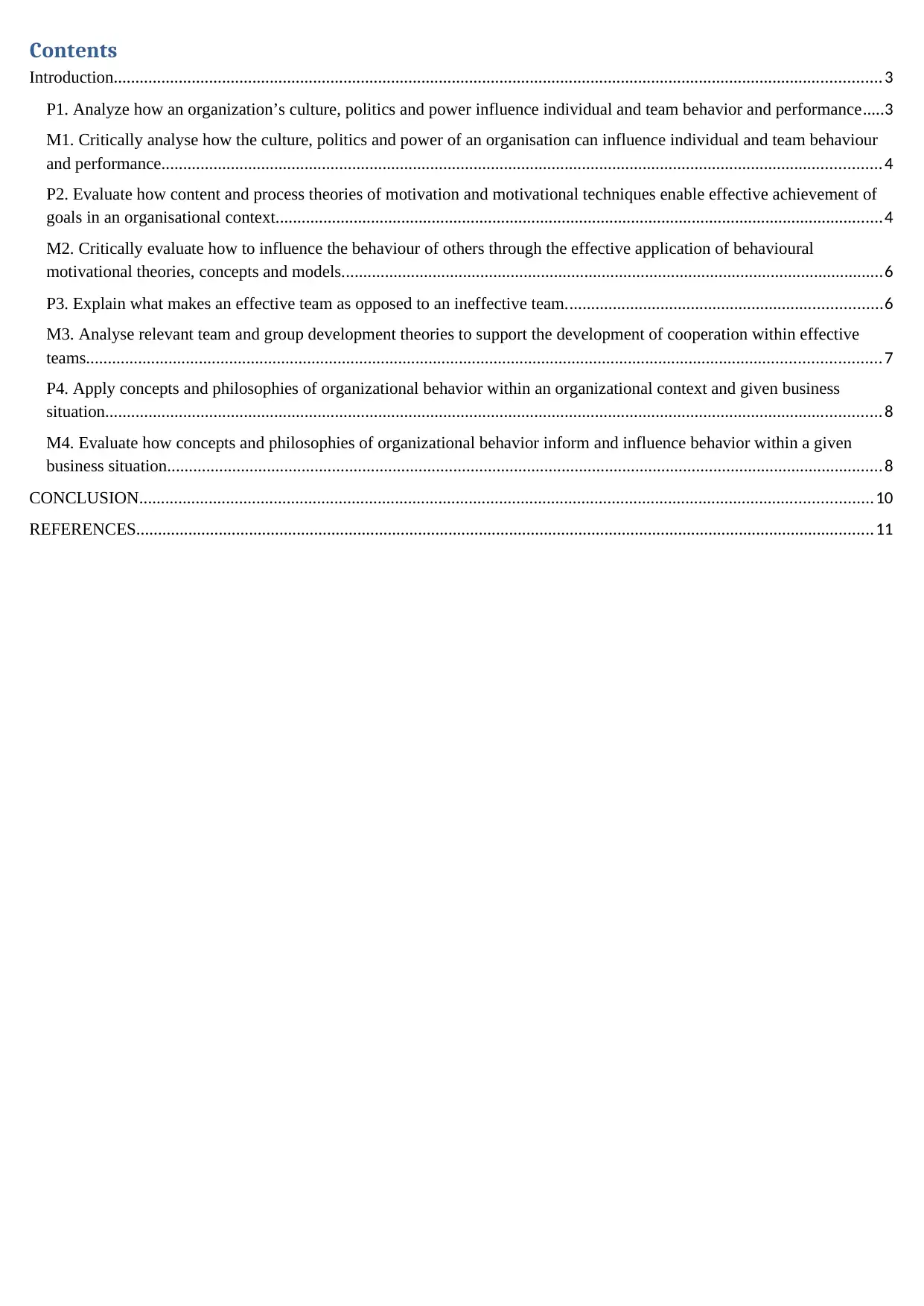
Contents
Introduction................................................................................................................................................................................. 3
P1. Analyze how an organization’s culture, politics and power influence individual and team behavior and performance.....3
M1. Critically analyse how the culture, politics and power of an organisation can influence individual and team behaviour
and performance...................................................................................................................................................................... 4
P2. Evaluate how content and process theories of motivation and motivational techniques enable effective achievement of
goals in an organisational context............................................................................................................................................4
M2. Critically evaluate how to influence the behaviour of others through the effective application of behavioural
motivational theories, concepts and models.............................................................................................................................6
P3. Explain what makes an effective team as opposed to an ineffective team.........................................................................6
M3. Analyse relevant team and group development theories to support the development of cooperation within effective
teams....................................................................................................................................................................................... 7
P4. Apply concepts and philosophies of organizational behavior within an organizational context and given business
situation................................................................................................................................................................................... 8
M4. Evaluate how concepts and philosophies of organizational behavior inform and influence behavior within a given
business situation.....................................................................................................................................................................8
CONCLUSION.........................................................................................................................................................................10
REFERENCES.......................................................................................................................................................................... 11
Introduction................................................................................................................................................................................. 3
P1. Analyze how an organization’s culture, politics and power influence individual and team behavior and performance.....3
M1. Critically analyse how the culture, politics and power of an organisation can influence individual and team behaviour
and performance...................................................................................................................................................................... 4
P2. Evaluate how content and process theories of motivation and motivational techniques enable effective achievement of
goals in an organisational context............................................................................................................................................4
M2. Critically evaluate how to influence the behaviour of others through the effective application of behavioural
motivational theories, concepts and models.............................................................................................................................6
P3. Explain what makes an effective team as opposed to an ineffective team.........................................................................6
M3. Analyse relevant team and group development theories to support the development of cooperation within effective
teams....................................................................................................................................................................................... 7
P4. Apply concepts and philosophies of organizational behavior within an organizational context and given business
situation................................................................................................................................................................................... 8
M4. Evaluate how concepts and philosophies of organizational behavior inform and influence behavior within a given
business situation.....................................................................................................................................................................8
CONCLUSION.........................................................................................................................................................................10
REFERENCES.......................................................................................................................................................................... 11
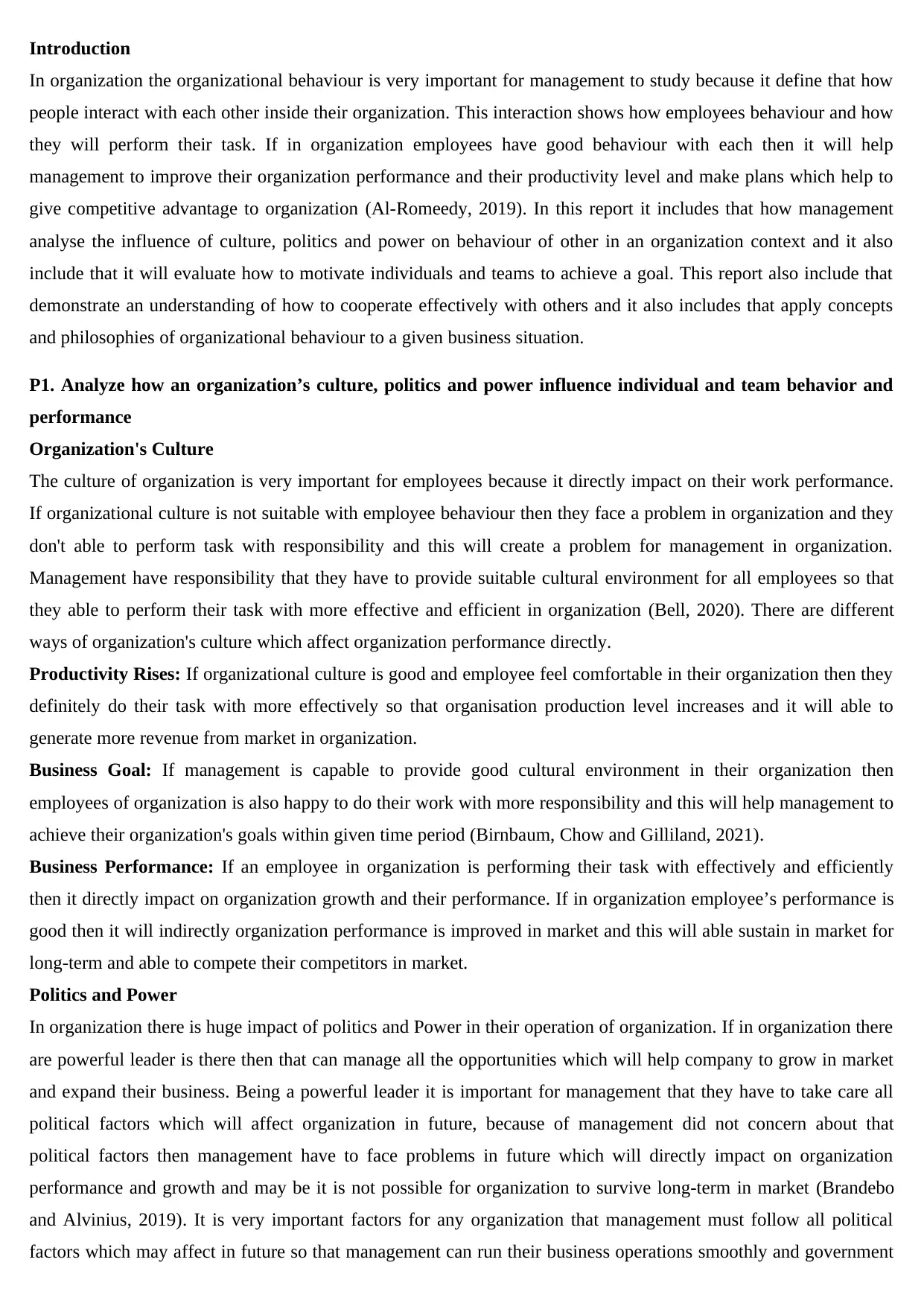
Introduction
In organization the organizational behaviour is very important for management to study because it define that how
people interact with each other inside their organization. This interaction shows how employees behaviour and how
they will perform their task. If in organization employees have good behaviour with each then it will help
management to improve their organization performance and their productivity level and make plans which help to
give competitive advantage to organization (Al-Romeedy, 2019). In this report it includes that how management
analyse the influence of culture, politics and power on behaviour of other in an organization context and it also
include that it will evaluate how to motivate individuals and teams to achieve a goal. This report also include that
demonstrate an understanding of how to cooperate effectively with others and it also includes that apply concepts
and philosophies of organizational behaviour to a given business situation.
P1. Analyze how an organization’s culture, politics and power influence individual and team behavior and
performance
Organization's Culture
The culture of organization is very important for employees because it directly impact on their work performance.
If organizational culture is not suitable with employee behaviour then they face a problem in organization and they
don't able to perform task with responsibility and this will create a problem for management in organization.
Management have responsibility that they have to provide suitable cultural environment for all employees so that
they able to perform their task with more effective and efficient in organization (Bell, 2020). There are different
ways of organization's culture which affect organization performance directly.
Productivity Rises: If organizational culture is good and employee feel comfortable in their organization then they
definitely do their task with more effectively so that organisation production level increases and it will able to
generate more revenue from market in organization.
Business Goal: If management is capable to provide good cultural environment in their organization then
employees of organization is also happy to do their work with more responsibility and this will help management to
achieve their organization's goals within given time period (Birnbaum, Chow and Gilliland, 2021).
Business Performance: If an employee in organization is performing their task with effectively and efficiently
then it directly impact on organization growth and their performance. If in organization employee’s performance is
good then it will indirectly organization performance is improved in market and this will able sustain in market for
long-term and able to compete their competitors in market.
Politics and Power
In organization there is huge impact of politics and Power in their operation of organization. If in organization there
are powerful leader is there then that can manage all the opportunities which will help company to grow in market
and expand their business. Being a powerful leader it is important for management that they have to take care all
political factors which will affect organization in future, because of management did not concern about that
political factors then management have to face problems in future which will directly impact on organization
performance and growth and may be it is not possible for organization to survive long-term in market (Brandebo
and Alvinius, 2019). It is very important factors for any organization that management must follow all political
factors which may affect in future so that management can run their business operations smoothly and government
In organization the organizational behaviour is very important for management to study because it define that how
people interact with each other inside their organization. This interaction shows how employees behaviour and how
they will perform their task. If in organization employees have good behaviour with each then it will help
management to improve their organization performance and their productivity level and make plans which help to
give competitive advantage to organization (Al-Romeedy, 2019). In this report it includes that how management
analyse the influence of culture, politics and power on behaviour of other in an organization context and it also
include that it will evaluate how to motivate individuals and teams to achieve a goal. This report also include that
demonstrate an understanding of how to cooperate effectively with others and it also includes that apply concepts
and philosophies of organizational behaviour to a given business situation.
P1. Analyze how an organization’s culture, politics and power influence individual and team behavior and
performance
Organization's Culture
The culture of organization is very important for employees because it directly impact on their work performance.
If organizational culture is not suitable with employee behaviour then they face a problem in organization and they
don't able to perform task with responsibility and this will create a problem for management in organization.
Management have responsibility that they have to provide suitable cultural environment for all employees so that
they able to perform their task with more effective and efficient in organization (Bell, 2020). There are different
ways of organization's culture which affect organization performance directly.
Productivity Rises: If organizational culture is good and employee feel comfortable in their organization then they
definitely do their task with more effectively so that organisation production level increases and it will able to
generate more revenue from market in organization.
Business Goal: If management is capable to provide good cultural environment in their organization then
employees of organization is also happy to do their work with more responsibility and this will help management to
achieve their organization's goals within given time period (Birnbaum, Chow and Gilliland, 2021).
Business Performance: If an employee in organization is performing their task with effectively and efficiently
then it directly impact on organization growth and their performance. If in organization employee’s performance is
good then it will indirectly organization performance is improved in market and this will able sustain in market for
long-term and able to compete their competitors in market.
Politics and Power
In organization there is huge impact of politics and Power in their operation of organization. If in organization there
are powerful leader is there then that can manage all the opportunities which will help company to grow in market
and expand their business. Being a powerful leader it is important for management that they have to take care all
political factors which will affect organization in future, because of management did not concern about that
political factors then management have to face problems in future which will directly impact on organization
performance and growth and may be it is not possible for organization to survive long-term in market (Brandebo
and Alvinius, 2019). It is very important factors for any organization that management must follow all political
factors which may affect in future so that management can run their business operations smoothly and government
⊘ This is a preview!⊘
Do you want full access?
Subscribe today to unlock all pages.

Trusted by 1+ million students worldwide
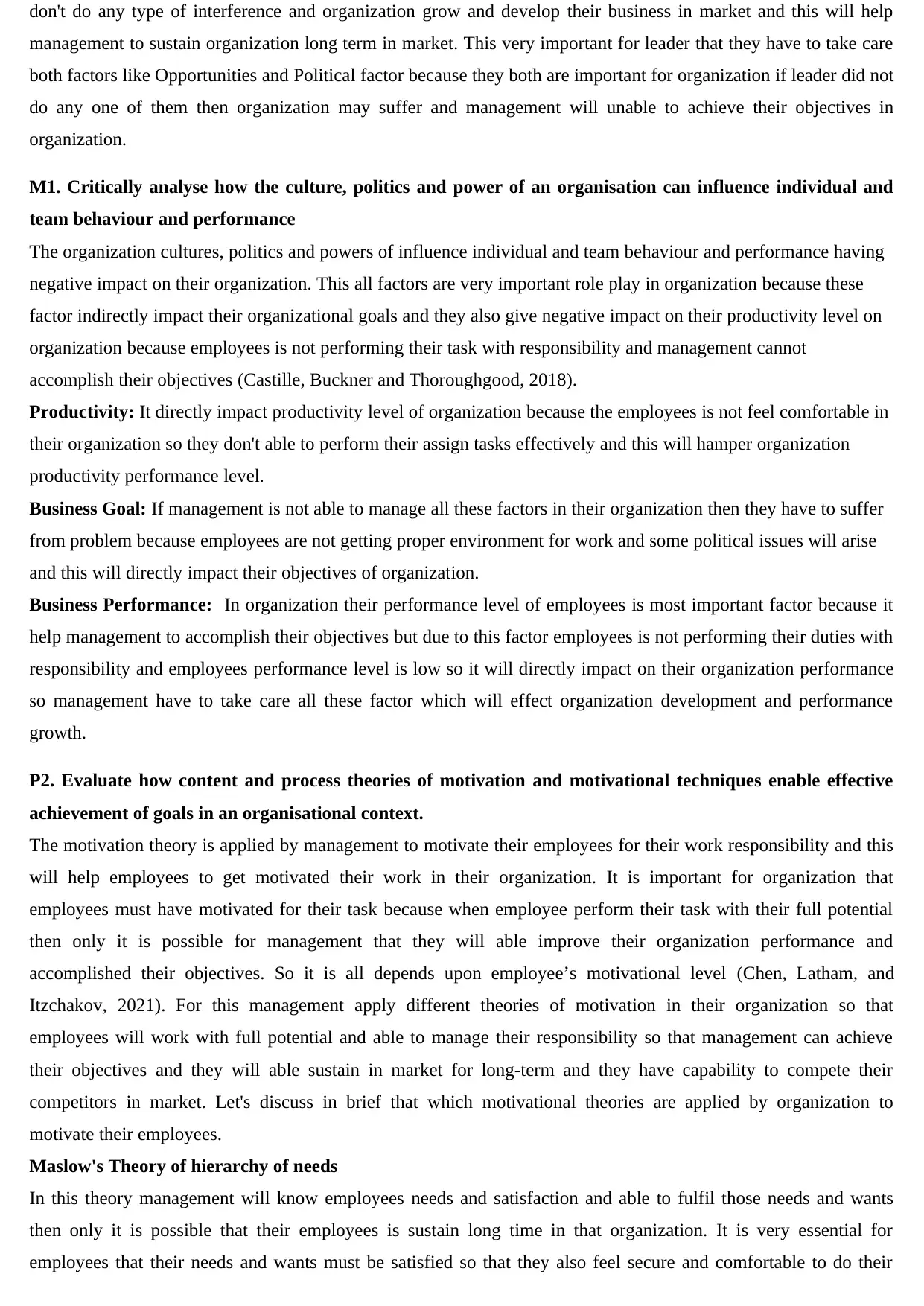
don't do any type of interference and organization grow and develop their business in market and this will help
management to sustain organization long term in market. This very important for leader that they have to take care
both factors like Opportunities and Political factor because they both are important for organization if leader did not
do any one of them then organization may suffer and management will unable to achieve their objectives in
organization.
M1. Critically analyse how the culture, politics and power of an organisation can influence individual and
team behaviour and performance
The organization cultures, politics and powers of influence individual and team behaviour and performance having
negative impact on their organization. This all factors are very important role play in organization because these
factor indirectly impact their organizational goals and they also give negative impact on their productivity level on
organization because employees is not performing their task with responsibility and management cannot
accomplish their objectives (Castille, Buckner and Thoroughgood, 2018).
Productivity: It directly impact productivity level of organization because the employees is not feel comfortable in
their organization so they don't able to perform their assign tasks effectively and this will hamper organization
productivity performance level.
Business Goal: If management is not able to manage all these factors in their organization then they have to suffer
from problem because employees are not getting proper environment for work and some political issues will arise
and this will directly impact their objectives of organization.
Business Performance: In organization their performance level of employees is most important factor because it
help management to accomplish their objectives but due to this factor employees is not performing their duties with
responsibility and employees performance level is low so it will directly impact on their organization performance
so management have to take care all these factor which will effect organization development and performance
growth.
P2. Evaluate how content and process theories of motivation and motivational techniques enable effective
achievement of goals in an organisational context.
The motivation theory is applied by management to motivate their employees for their work responsibility and this
will help employees to get motivated their work in their organization. It is important for organization that
employees must have motivated for their task because when employee perform their task with their full potential
then only it is possible for management that they will able improve their organization performance and
accomplished their objectives. So it is all depends upon employee’s motivational level (Chen, Latham, and
Itzchakov, 2021). For this management apply different theories of motivation in their organization so that
employees will work with full potential and able to manage their responsibility so that management can achieve
their objectives and they will able sustain in market for long-term and they have capability to compete their
competitors in market. Let's discuss in brief that which motivational theories are applied by organization to
motivate their employees.
Maslow's Theory of hierarchy of needs
In this theory management will know employees needs and satisfaction and able to fulfil those needs and wants
then only it is possible that their employees is sustain long time in that organization. It is very essential for
employees that their needs and wants must be satisfied so that they also feel secure and comfortable to do their
management to sustain organization long term in market. This very important for leader that they have to take care
both factors like Opportunities and Political factor because they both are important for organization if leader did not
do any one of them then organization may suffer and management will unable to achieve their objectives in
organization.
M1. Critically analyse how the culture, politics and power of an organisation can influence individual and
team behaviour and performance
The organization cultures, politics and powers of influence individual and team behaviour and performance having
negative impact on their organization. This all factors are very important role play in organization because these
factor indirectly impact their organizational goals and they also give negative impact on their productivity level on
organization because employees is not performing their task with responsibility and management cannot
accomplish their objectives (Castille, Buckner and Thoroughgood, 2018).
Productivity: It directly impact productivity level of organization because the employees is not feel comfortable in
their organization so they don't able to perform their assign tasks effectively and this will hamper organization
productivity performance level.
Business Goal: If management is not able to manage all these factors in their organization then they have to suffer
from problem because employees are not getting proper environment for work and some political issues will arise
and this will directly impact their objectives of organization.
Business Performance: In organization their performance level of employees is most important factor because it
help management to accomplish their objectives but due to this factor employees is not performing their duties with
responsibility and employees performance level is low so it will directly impact on their organization performance
so management have to take care all these factor which will effect organization development and performance
growth.
P2. Evaluate how content and process theories of motivation and motivational techniques enable effective
achievement of goals in an organisational context.
The motivation theory is applied by management to motivate their employees for their work responsibility and this
will help employees to get motivated their work in their organization. It is important for organization that
employees must have motivated for their task because when employee perform their task with their full potential
then only it is possible for management that they will able improve their organization performance and
accomplished their objectives. So it is all depends upon employee’s motivational level (Chen, Latham, and
Itzchakov, 2021). For this management apply different theories of motivation in their organization so that
employees will work with full potential and able to manage their responsibility so that management can achieve
their objectives and they will able sustain in market for long-term and they have capability to compete their
competitors in market. Let's discuss in brief that which motivational theories are applied by organization to
motivate their employees.
Maslow's Theory of hierarchy of needs
In this theory management will know employees needs and satisfaction and able to fulfil those needs and wants
then only it is possible that their employees is sustain long time in that organization. It is very essential for
employees that their needs and wants must be satisfied so that they also feel secure and comfortable to do their
Paraphrase This Document
Need a fresh take? Get an instant paraphrase of this document with our AI Paraphraser
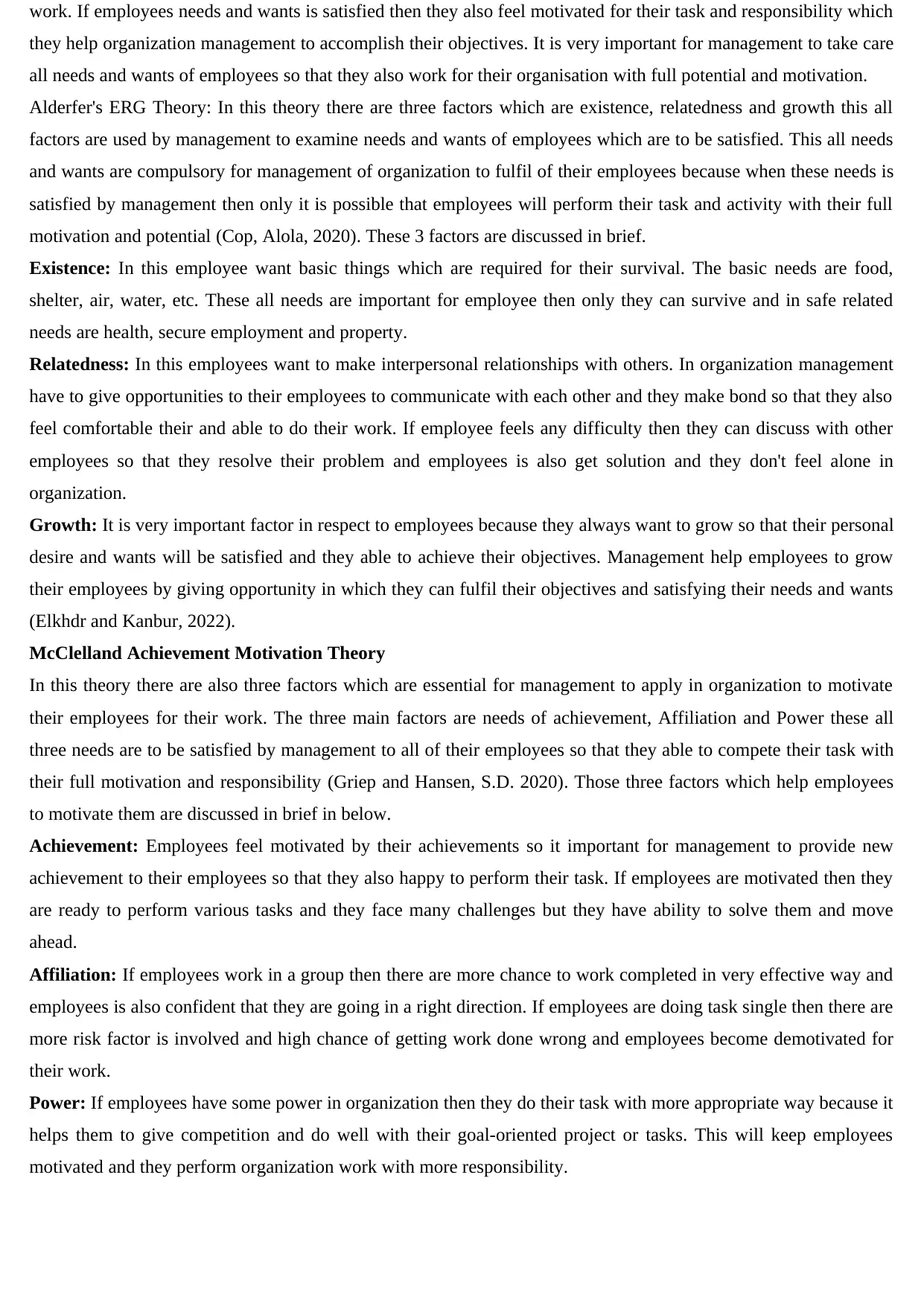
work. If employees needs and wants is satisfied then they also feel motivated for their task and responsibility which
they help organization management to accomplish their objectives. It is very important for management to take care
all needs and wants of employees so that they also work for their organisation with full potential and motivation.
Alderfer's ERG Theory: In this theory there are three factors which are existence, relatedness and growth this all
factors are used by management to examine needs and wants of employees which are to be satisfied. This all needs
and wants are compulsory for management of organization to fulfil of their employees because when these needs is
satisfied by management then only it is possible that employees will perform their task and activity with their full
motivation and potential (Cop, Alola, 2020). These 3 factors are discussed in brief.
Existence: In this employee want basic things which are required for their survival. The basic needs are food,
shelter, air, water, etc. These all needs are important for employee then only they can survive and in safe related
needs are health, secure employment and property.
Relatedness: In this employees want to make interpersonal relationships with others. In organization management
have to give opportunities to their employees to communicate with each other and they make bond so that they also
feel comfortable their and able to do their work. If employee feels any difficulty then they can discuss with other
employees so that they resolve their problem and employees is also get solution and they don't feel alone in
organization.
Growth: It is very important factor in respect to employees because they always want to grow so that their personal
desire and wants will be satisfied and they able to achieve their objectives. Management help employees to grow
their employees by giving opportunity in which they can fulfil their objectives and satisfying their needs and wants
(Elkhdr and Kanbur, 2022).
McClelland Achievement Motivation Theory
In this theory there are also three factors which are essential for management to apply in organization to motivate
their employees for their work. The three main factors are needs of achievement, Affiliation and Power these all
three needs are to be satisfied by management to all of their employees so that they able to compete their task with
their full motivation and responsibility (Griep and Hansen, S.D. 2020). Those three factors which help employees
to motivate them are discussed in brief in below.
Achievement: Employees feel motivated by their achievements so it important for management to provide new
achievement to their employees so that they also happy to perform their task. If employees are motivated then they
are ready to perform various tasks and they face many challenges but they have ability to solve them and move
ahead.
Affiliation: If employees work in a group then there are more chance to work completed in very effective way and
employees is also confident that they are going in a right direction. If employees are doing task single then there are
more risk factor is involved and high chance of getting work done wrong and employees become demotivated for
their work.
Power: If employees have some power in organization then they do their task with more appropriate way because it
helps them to give competition and do well with their goal-oriented project or tasks. This will keep employees
motivated and they perform organization work with more responsibility.
they help organization management to accomplish their objectives. It is very important for management to take care
all needs and wants of employees so that they also work for their organisation with full potential and motivation.
Alderfer's ERG Theory: In this theory there are three factors which are existence, relatedness and growth this all
factors are used by management to examine needs and wants of employees which are to be satisfied. This all needs
and wants are compulsory for management of organization to fulfil of their employees because when these needs is
satisfied by management then only it is possible that employees will perform their task and activity with their full
motivation and potential (Cop, Alola, 2020). These 3 factors are discussed in brief.
Existence: In this employee want basic things which are required for their survival. The basic needs are food,
shelter, air, water, etc. These all needs are important for employee then only they can survive and in safe related
needs are health, secure employment and property.
Relatedness: In this employees want to make interpersonal relationships with others. In organization management
have to give opportunities to their employees to communicate with each other and they make bond so that they also
feel comfortable their and able to do their work. If employee feels any difficulty then they can discuss with other
employees so that they resolve their problem and employees is also get solution and they don't feel alone in
organization.
Growth: It is very important factor in respect to employees because they always want to grow so that their personal
desire and wants will be satisfied and they able to achieve their objectives. Management help employees to grow
their employees by giving opportunity in which they can fulfil their objectives and satisfying their needs and wants
(Elkhdr and Kanbur, 2022).
McClelland Achievement Motivation Theory
In this theory there are also three factors which are essential for management to apply in organization to motivate
their employees for their work. The three main factors are needs of achievement, Affiliation and Power these all
three needs are to be satisfied by management to all of their employees so that they able to compete their task with
their full motivation and responsibility (Griep and Hansen, S.D. 2020). Those three factors which help employees
to motivate them are discussed in brief in below.
Achievement: Employees feel motivated by their achievements so it important for management to provide new
achievement to their employees so that they also happy to perform their task. If employees are motivated then they
are ready to perform various tasks and they face many challenges but they have ability to solve them and move
ahead.
Affiliation: If employees work in a group then there are more chance to work completed in very effective way and
employees is also confident that they are going in a right direction. If employees are doing task single then there are
more risk factor is involved and high chance of getting work done wrong and employees become demotivated for
their work.
Power: If employees have some power in organization then they do their task with more appropriate way because it
helps them to give competition and do well with their goal-oriented project or tasks. This will keep employees
motivated and they perform organization work with more responsibility.
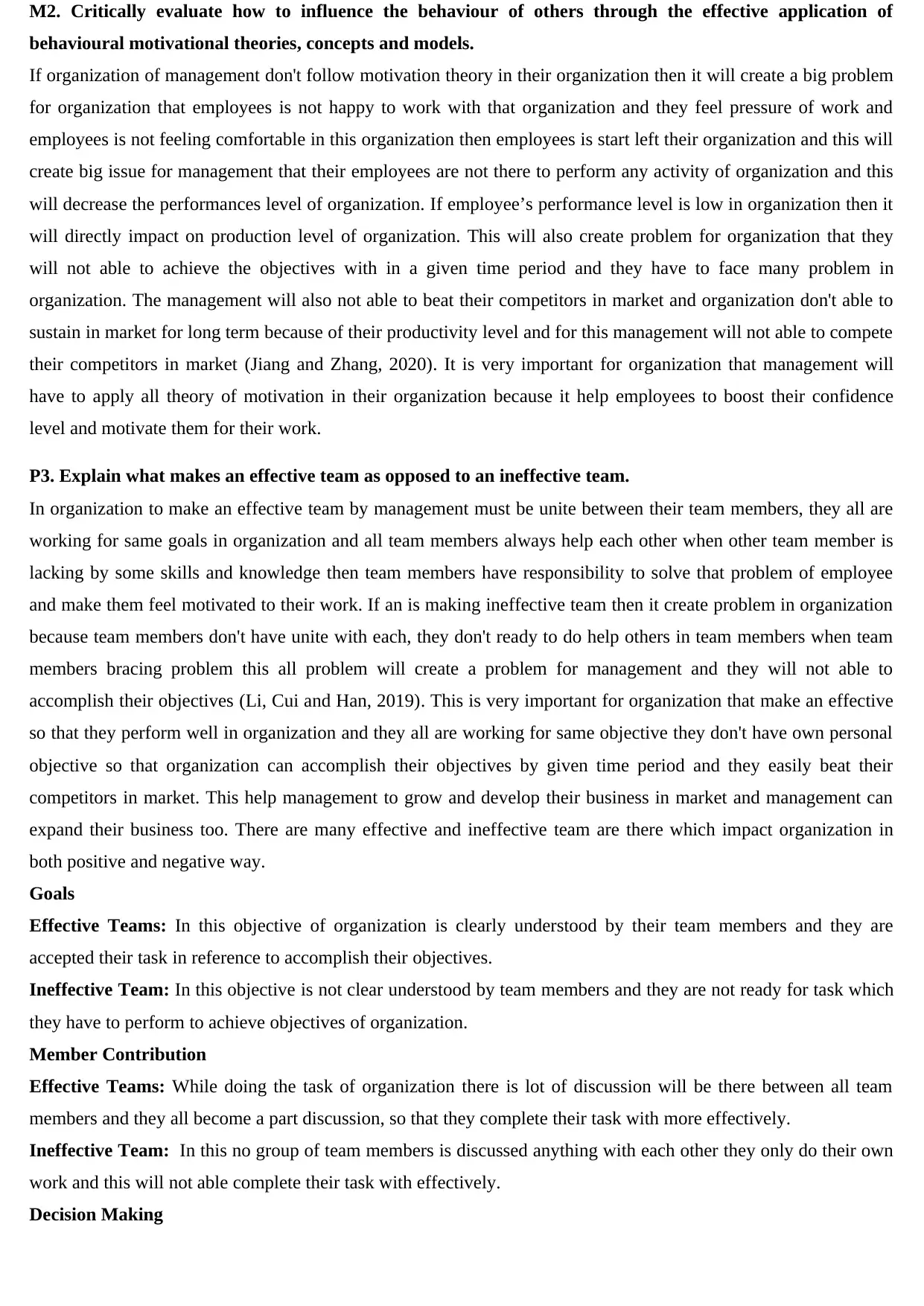
M2. Critically evaluate how to influence the behaviour of others through the effective application of
behavioural motivational theories, concepts and models.
If organization of management don't follow motivation theory in their organization then it will create a big problem
for organization that employees is not happy to work with that organization and they feel pressure of work and
employees is not feeling comfortable in this organization then employees is start left their organization and this will
create big issue for management that their employees are not there to perform any activity of organization and this
will decrease the performances level of organization. If employee’s performance level is low in organization then it
will directly impact on production level of organization. This will also create problem for organization that they
will not able to achieve the objectives with in a given time period and they have to face many problem in
organization. The management will also not able to beat their competitors in market and organization don't able to
sustain in market for long term because of their productivity level and for this management will not able to compete
their competitors in market (Jiang and Zhang, 2020). It is very important for organization that management will
have to apply all theory of motivation in their organization because it help employees to boost their confidence
level and motivate them for their work.
P3. Explain what makes an effective team as opposed to an ineffective team.
In organization to make an effective team by management must be unite between their team members, they all are
working for same goals in organization and all team members always help each other when other team member is
lacking by some skills and knowledge then team members have responsibility to solve that problem of employee
and make them feel motivated to their work. If an is making ineffective team then it create problem in organization
because team members don't have unite with each, they don't ready to do help others in team members when team
members bracing problem this all problem will create a problem for management and they will not able to
accomplish their objectives (Li, Cui and Han, 2019). This is very important for organization that make an effective
so that they perform well in organization and they all are working for same objective they don't have own personal
objective so that organization can accomplish their objectives by given time period and they easily beat their
competitors in market. This help management to grow and develop their business in market and management can
expand their business too. There are many effective and ineffective team are there which impact organization in
both positive and negative way.
Goals
Effective Teams: In this objective of organization is clearly understood by their team members and they are
accepted their task in reference to accomplish their objectives.
Ineffective Team: In this objective is not clear understood by team members and they are not ready for task which
they have to perform to achieve objectives of organization.
Member Contribution
Effective Teams: While doing the task of organization there is lot of discussion will be there between all team
members and they all become a part discussion, so that they complete their task with more effectively.
Ineffective Team: In this no group of team members is discussed anything with each other they only do their own
work and this will not able complete their task with effectively.
Decision Making
behavioural motivational theories, concepts and models.
If organization of management don't follow motivation theory in their organization then it will create a big problem
for organization that employees is not happy to work with that organization and they feel pressure of work and
employees is not feeling comfortable in this organization then employees is start left their organization and this will
create big issue for management that their employees are not there to perform any activity of organization and this
will decrease the performances level of organization. If employee’s performance level is low in organization then it
will directly impact on production level of organization. This will also create problem for organization that they
will not able to achieve the objectives with in a given time period and they have to face many problem in
organization. The management will also not able to beat their competitors in market and organization don't able to
sustain in market for long term because of their productivity level and for this management will not able to compete
their competitors in market (Jiang and Zhang, 2020). It is very important for organization that management will
have to apply all theory of motivation in their organization because it help employees to boost their confidence
level and motivate them for their work.
P3. Explain what makes an effective team as opposed to an ineffective team.
In organization to make an effective team by management must be unite between their team members, they all are
working for same goals in organization and all team members always help each other when other team member is
lacking by some skills and knowledge then team members have responsibility to solve that problem of employee
and make them feel motivated to their work. If an is making ineffective team then it create problem in organization
because team members don't have unite with each, they don't ready to do help others in team members when team
members bracing problem this all problem will create a problem for management and they will not able to
accomplish their objectives (Li, Cui and Han, 2019). This is very important for organization that make an effective
so that they perform well in organization and they all are working for same objective they don't have own personal
objective so that organization can accomplish their objectives by given time period and they easily beat their
competitors in market. This help management to grow and develop their business in market and management can
expand their business too. There are many effective and ineffective team are there which impact organization in
both positive and negative way.
Goals
Effective Teams: In this objective of organization is clearly understood by their team members and they are
accepted their task in reference to accomplish their objectives.
Ineffective Team: In this objective is not clear understood by team members and they are not ready for task which
they have to perform to achieve objectives of organization.
Member Contribution
Effective Teams: While doing the task of organization there is lot of discussion will be there between all team
members and they all become a part discussion, so that they complete their task with more effectively.
Ineffective Team: In this no group of team members is discussed anything with each other they only do their own
work and this will not able complete their task with effectively.
Decision Making
⊘ This is a preview!⊘
Do you want full access?
Subscribe today to unlock all pages.

Trusted by 1+ million students worldwide
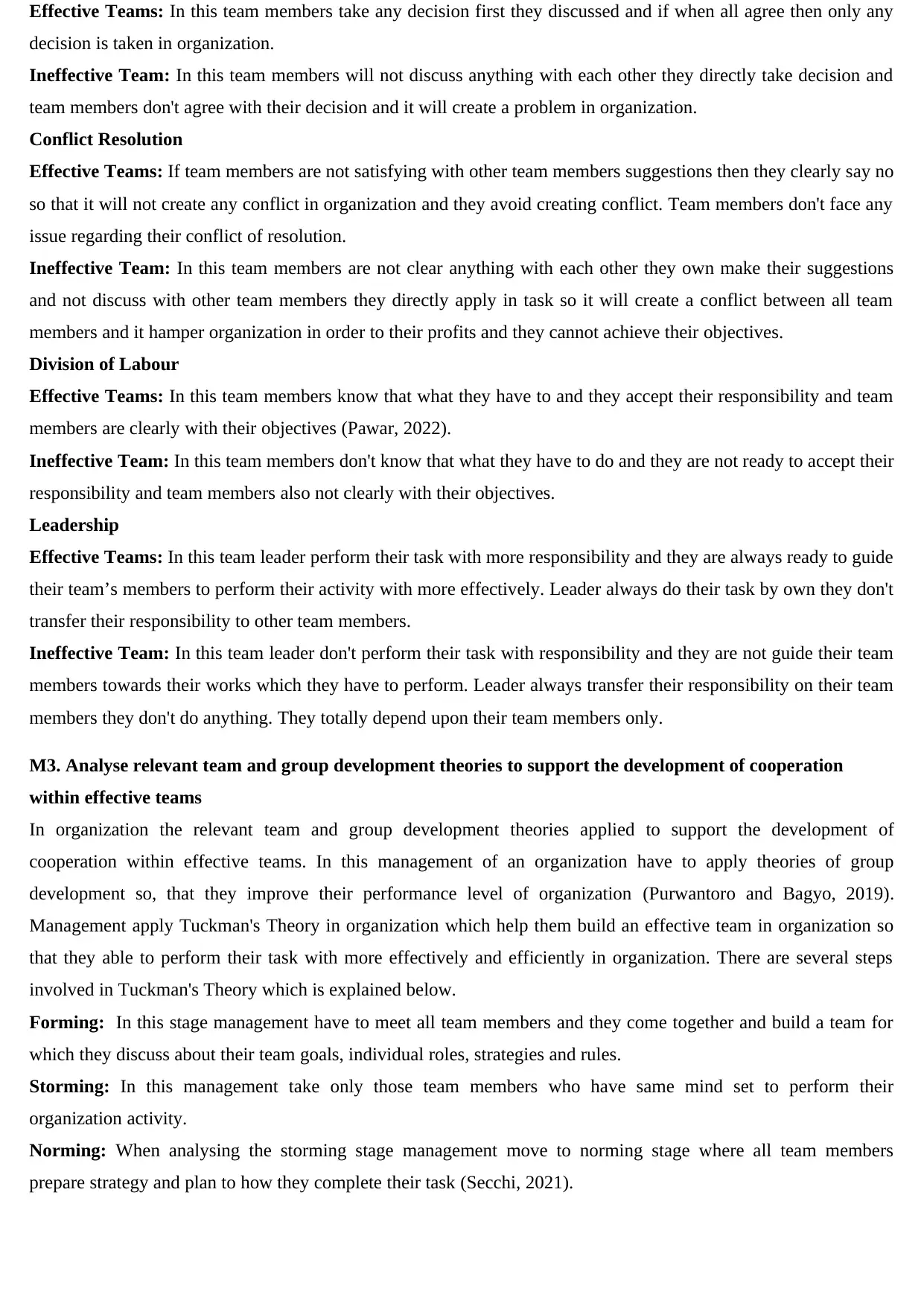
Effective Teams: In this team members take any decision first they discussed and if when all agree then only any
decision is taken in organization.
Ineffective Team: In this team members will not discuss anything with each other they directly take decision and
team members don't agree with their decision and it will create a problem in organization.
Conflict Resolution
Effective Teams: If team members are not satisfying with other team members suggestions then they clearly say no
so that it will not create any conflict in organization and they avoid creating conflict. Team members don't face any
issue regarding their conflict of resolution.
Ineffective Team: In this team members are not clear anything with each other they own make their suggestions
and not discuss with other team members they directly apply in task so it will create a conflict between all team
members and it hamper organization in order to their profits and they cannot achieve their objectives.
Division of Labour
Effective Teams: In this team members know that what they have to and they accept their responsibility and team
members are clearly with their objectives (Pawar, 2022).
Ineffective Team: In this team members don't know that what they have to do and they are not ready to accept their
responsibility and team members also not clearly with their objectives.
Leadership
Effective Teams: In this team leader perform their task with more responsibility and they are always ready to guide
their team’s members to perform their activity with more effectively. Leader always do their task by own they don't
transfer their responsibility to other team members.
Ineffective Team: In this team leader don't perform their task with responsibility and they are not guide their team
members towards their works which they have to perform. Leader always transfer their responsibility on their team
members they don't do anything. They totally depend upon their team members only.
M3. Analyse relevant team and group development theories to support the development of cooperation
within effective teams
In organization the relevant team and group development theories applied to support the development of
cooperation within effective teams. In this management of an organization have to apply theories of group
development so, that they improve their performance level of organization (Purwantoro and Bagyo, 2019).
Management apply Tuckman's Theory in organization which help them build an effective team in organization so
that they able to perform their task with more effectively and efficiently in organization. There are several steps
involved in Tuckman's Theory which is explained below.
Forming: In this stage management have to meet all team members and they come together and build a team for
which they discuss about their team goals, individual roles, strategies and rules.
Storming: In this management take only those team members who have same mind set to perform their
organization activity.
Norming: When analysing the storming stage management move to norming stage where all team members
prepare strategy and plan to how they complete their task (Secchi, 2021).
decision is taken in organization.
Ineffective Team: In this team members will not discuss anything with each other they directly take decision and
team members don't agree with their decision and it will create a problem in organization.
Conflict Resolution
Effective Teams: If team members are not satisfying with other team members suggestions then they clearly say no
so that it will not create any conflict in organization and they avoid creating conflict. Team members don't face any
issue regarding their conflict of resolution.
Ineffective Team: In this team members are not clear anything with each other they own make their suggestions
and not discuss with other team members they directly apply in task so it will create a conflict between all team
members and it hamper organization in order to their profits and they cannot achieve their objectives.
Division of Labour
Effective Teams: In this team members know that what they have to and they accept their responsibility and team
members are clearly with their objectives (Pawar, 2022).
Ineffective Team: In this team members don't know that what they have to do and they are not ready to accept their
responsibility and team members also not clearly with their objectives.
Leadership
Effective Teams: In this team leader perform their task with more responsibility and they are always ready to guide
their team’s members to perform their activity with more effectively. Leader always do their task by own they don't
transfer their responsibility to other team members.
Ineffective Team: In this team leader don't perform their task with responsibility and they are not guide their team
members towards their works which they have to perform. Leader always transfer their responsibility on their team
members they don't do anything. They totally depend upon their team members only.
M3. Analyse relevant team and group development theories to support the development of cooperation
within effective teams
In organization the relevant team and group development theories applied to support the development of
cooperation within effective teams. In this management of an organization have to apply theories of group
development so, that they improve their performance level of organization (Purwantoro and Bagyo, 2019).
Management apply Tuckman's Theory in organization which help them build an effective team in organization so
that they able to perform their task with more effectively and efficiently in organization. There are several steps
involved in Tuckman's Theory which is explained below.
Forming: In this stage management have to meet all team members and they come together and build a team for
which they discuss about their team goals, individual roles, strategies and rules.
Storming: In this management take only those team members who have same mind set to perform their
organization activity.
Norming: When analysing the storming stage management move to norming stage where all team members
prepare strategy and plan to how they complete their task (Secchi, 2021).
Paraphrase This Document
Need a fresh take? Get an instant paraphrase of this document with our AI Paraphraser
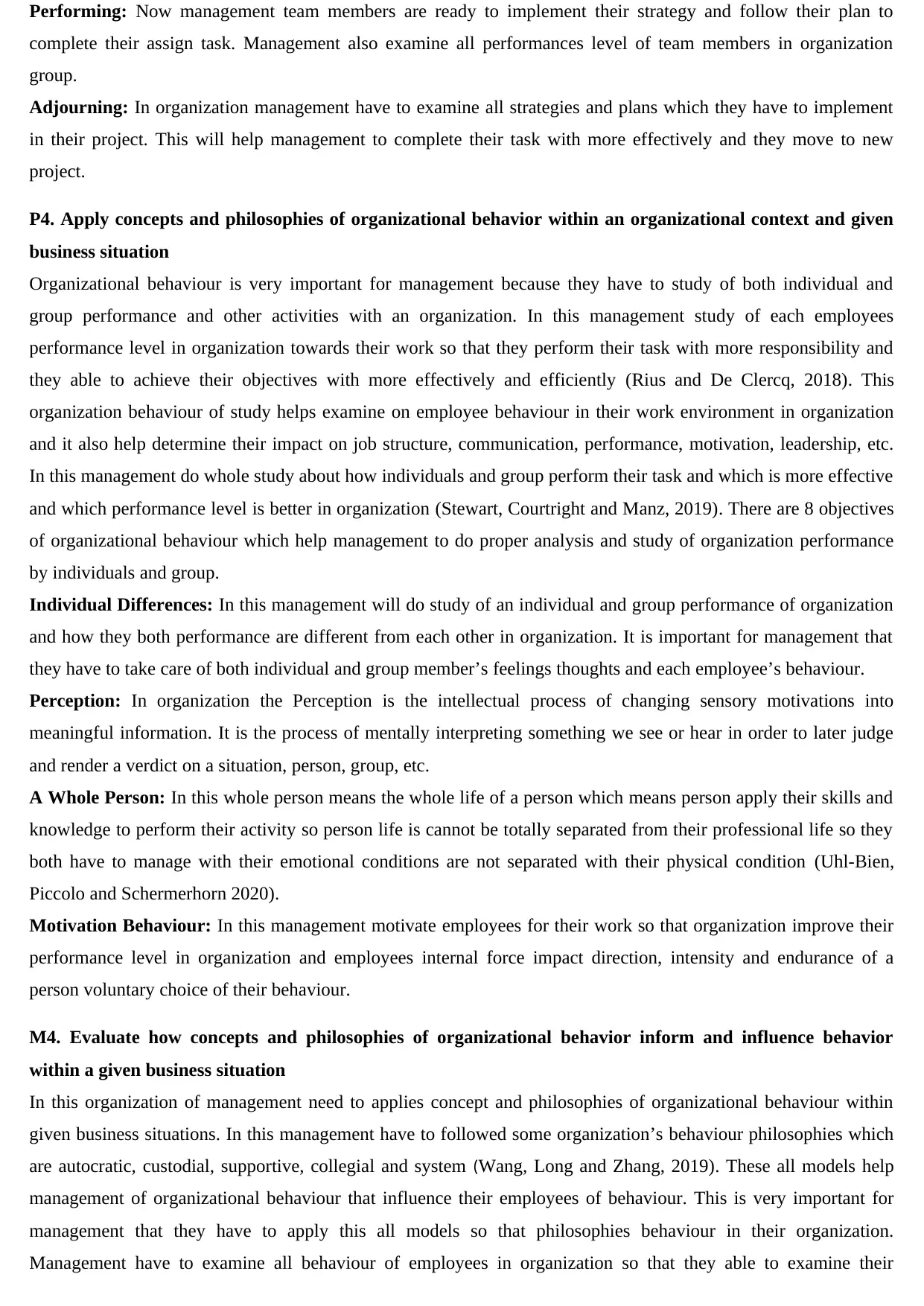
Performing: Now management team members are ready to implement their strategy and follow their plan to
complete their assign task. Management also examine all performances level of team members in organization
group.
Adjourning: In organization management have to examine all strategies and plans which they have to implement
in their project. This will help management to complete their task with more effectively and they move to new
project.
P4. Apply concepts and philosophies of organizational behavior within an organizational context and given
business situation
Organizational behaviour is very important for management because they have to study of both individual and
group performance and other activities with an organization. In this management study of each employees
performance level in organization towards their work so that they perform their task with more responsibility and
they able to achieve their objectives with more effectively and efficiently (Rius and De Clercq, 2018). This
organization behaviour of study helps examine on employee behaviour in their work environment in organization
and it also help determine their impact on job structure, communication, performance, motivation, leadership, etc.
In this management do whole study about how individuals and group perform their task and which is more effective
and which performance level is better in organization (Stewart, Courtright and Manz, 2019). There are 8 objectives
of organizational behaviour which help management to do proper analysis and study of organization performance
by individuals and group.
Individual Differences: In this management will do study of an individual and group performance of organization
and how they both performance are different from each other in organization. It is important for management that
they have to take care of both individual and group member’s feelings thoughts and each employee’s behaviour.
Perception: In organization the Perception is the intellectual process of changing sensory motivations into
meaningful information. It is the process of mentally interpreting something we see or hear in order to later judge
and render a verdict on a situation, person, group, etc.
A Whole Person: In this whole person means the whole life of a person which means person apply their skills and
knowledge to perform their activity so person life is cannot be totally separated from their professional life so they
both have to manage with their emotional conditions are not separated with their physical condition (Uhl-Bien,
Piccolo and Schermerhorn 2020).
Motivation Behaviour: In this management motivate employees for their work so that organization improve their
performance level in organization and employees internal force impact direction, intensity and endurance of a
person voluntary choice of their behaviour.
M4. Evaluate how concepts and philosophies of organizational behavior inform and influence behavior
within a given business situation
In this organization of management need to applies concept and philosophies of organizational behaviour within
given business situations. In this management have to followed some organization’s behaviour philosophies which
are autocratic, custodial, supportive, collegial and system (Wang, Long and Zhang, 2019). These all models help
management of organizational behaviour that influence their employees of behaviour. This is very important for
management that they have to apply this all models so that philosophies behaviour in their organization.
Management have to examine all behaviour of employees in organization so that they able to examine their
complete their assign task. Management also examine all performances level of team members in organization
group.
Adjourning: In organization management have to examine all strategies and plans which they have to implement
in their project. This will help management to complete their task with more effectively and they move to new
project.
P4. Apply concepts and philosophies of organizational behavior within an organizational context and given
business situation
Organizational behaviour is very important for management because they have to study of both individual and
group performance and other activities with an organization. In this management study of each employees
performance level in organization towards their work so that they perform their task with more responsibility and
they able to achieve their objectives with more effectively and efficiently (Rius and De Clercq, 2018). This
organization behaviour of study helps examine on employee behaviour in their work environment in organization
and it also help determine their impact on job structure, communication, performance, motivation, leadership, etc.
In this management do whole study about how individuals and group perform their task and which is more effective
and which performance level is better in organization (Stewart, Courtright and Manz, 2019). There are 8 objectives
of organizational behaviour which help management to do proper analysis and study of organization performance
by individuals and group.
Individual Differences: In this management will do study of an individual and group performance of organization
and how they both performance are different from each other in organization. It is important for management that
they have to take care of both individual and group member’s feelings thoughts and each employee’s behaviour.
Perception: In organization the Perception is the intellectual process of changing sensory motivations into
meaningful information. It is the process of mentally interpreting something we see or hear in order to later judge
and render a verdict on a situation, person, group, etc.
A Whole Person: In this whole person means the whole life of a person which means person apply their skills and
knowledge to perform their activity so person life is cannot be totally separated from their professional life so they
both have to manage with their emotional conditions are not separated with their physical condition (Uhl-Bien,
Piccolo and Schermerhorn 2020).
Motivation Behaviour: In this management motivate employees for their work so that organization improve their
performance level in organization and employees internal force impact direction, intensity and endurance of a
person voluntary choice of their behaviour.
M4. Evaluate how concepts and philosophies of organizational behavior inform and influence behavior
within a given business situation
In this organization of management need to applies concept and philosophies of organizational behaviour within
given business situations. In this management have to followed some organization’s behaviour philosophies which
are autocratic, custodial, supportive, collegial and system (Wang, Long and Zhang, 2019). These all models help
management of organizational behaviour that influence their employees of behaviour. This is very important for
management that they have to apply this all models so that philosophies behaviour in their organization.
Management have to examine all behaviour of employees in organization so that they able to examine their
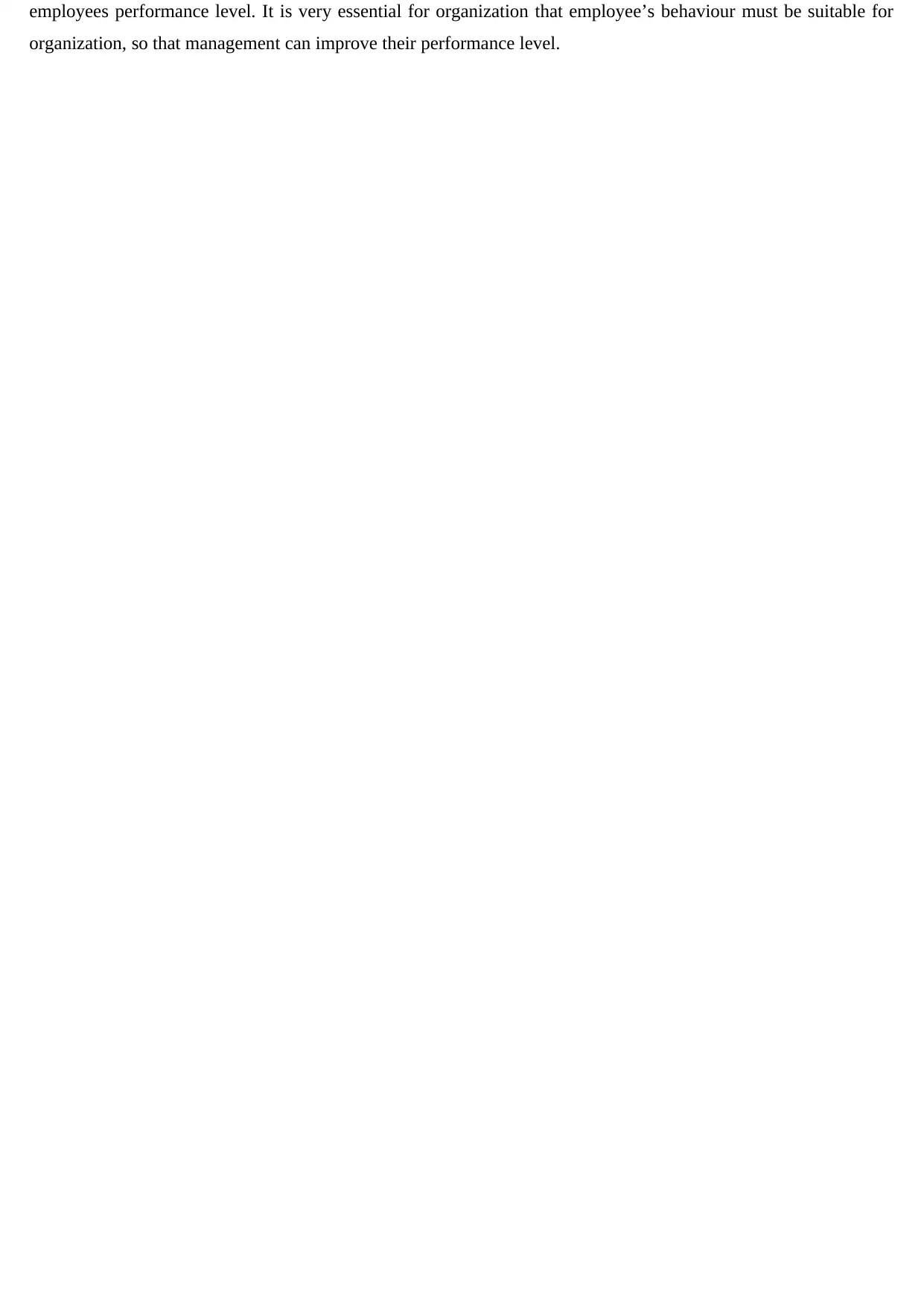
employees performance level. It is very essential for organization that employee’s behaviour must be suitable for
organization, so that management can improve their performance level.
organization, so that management can improve their performance level.
⊘ This is a preview!⊘
Do you want full access?
Subscribe today to unlock all pages.

Trusted by 1+ million students worldwide
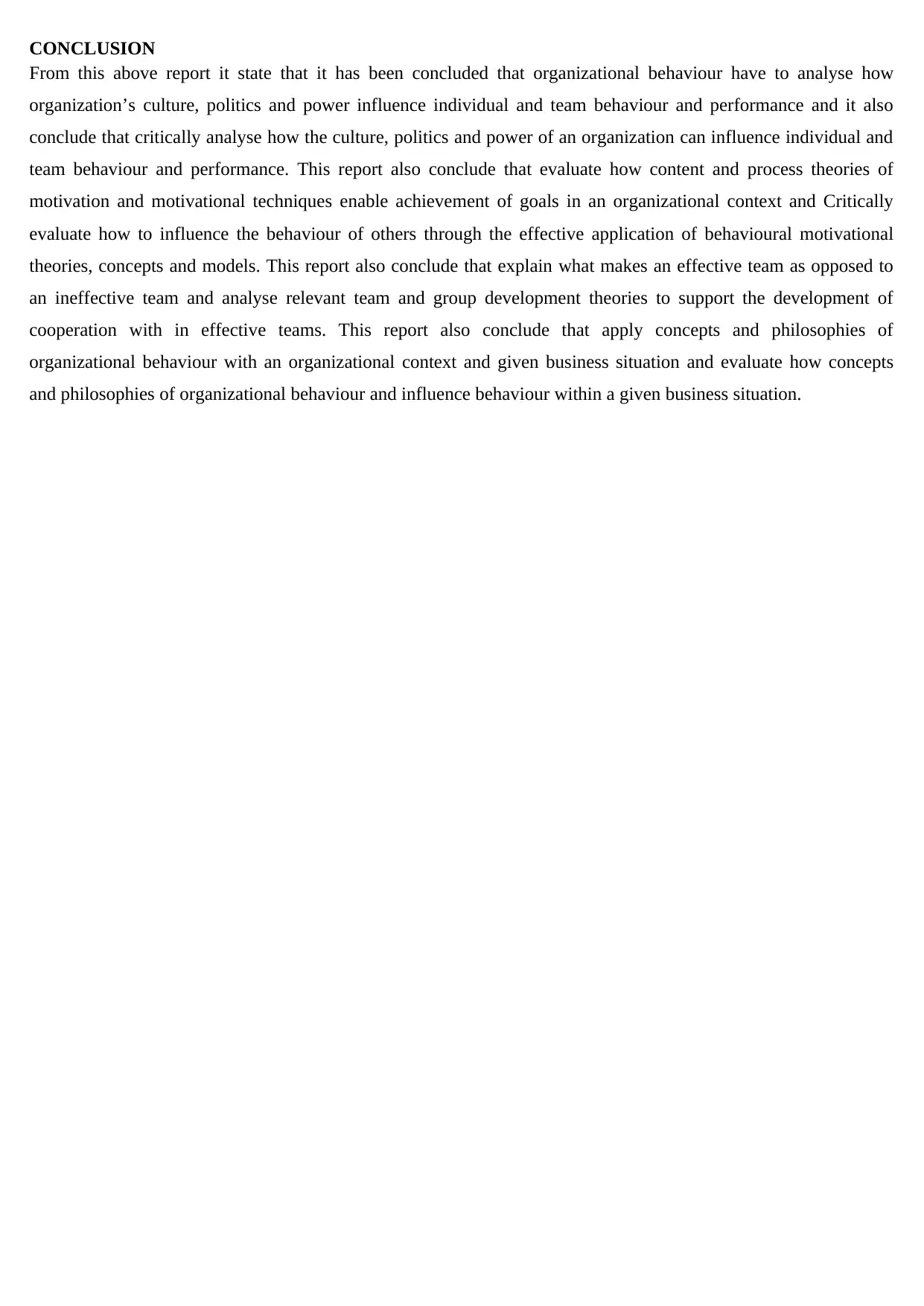
CONCLUSION
From this above report it state that it has been concluded that organizational behaviour have to analyse how
organization’s culture, politics and power influence individual and team behaviour and performance and it also
conclude that critically analyse how the culture, politics and power of an organization can influence individual and
team behaviour and performance. This report also conclude that evaluate how content and process theories of
motivation and motivational techniques enable achievement of goals in an organizational context and Critically
evaluate how to influence the behaviour of others through the effective application of behavioural motivational
theories, concepts and models. This report also conclude that explain what makes an effective team as opposed to
an ineffective team and analyse relevant team and group development theories to support the development of
cooperation with in effective teams. This report also conclude that apply concepts and philosophies of
organizational behaviour with an organizational context and given business situation and evaluate how concepts
and philosophies of organizational behaviour and influence behaviour within a given business situation.
From this above report it state that it has been concluded that organizational behaviour have to analyse how
organization’s culture, politics and power influence individual and team behaviour and performance and it also
conclude that critically analyse how the culture, politics and power of an organization can influence individual and
team behaviour and performance. This report also conclude that evaluate how content and process theories of
motivation and motivational techniques enable achievement of goals in an organizational context and Critically
evaluate how to influence the behaviour of others through the effective application of behavioural motivational
theories, concepts and models. This report also conclude that explain what makes an effective team as opposed to
an ineffective team and analyse relevant team and group development theories to support the development of
cooperation with in effective teams. This report also conclude that apply concepts and philosophies of
organizational behaviour with an organizational context and given business situation and evaluate how concepts
and philosophies of organizational behaviour and influence behaviour within a given business situation.
Paraphrase This Document
Need a fresh take? Get an instant paraphrase of this document with our AI Paraphraser
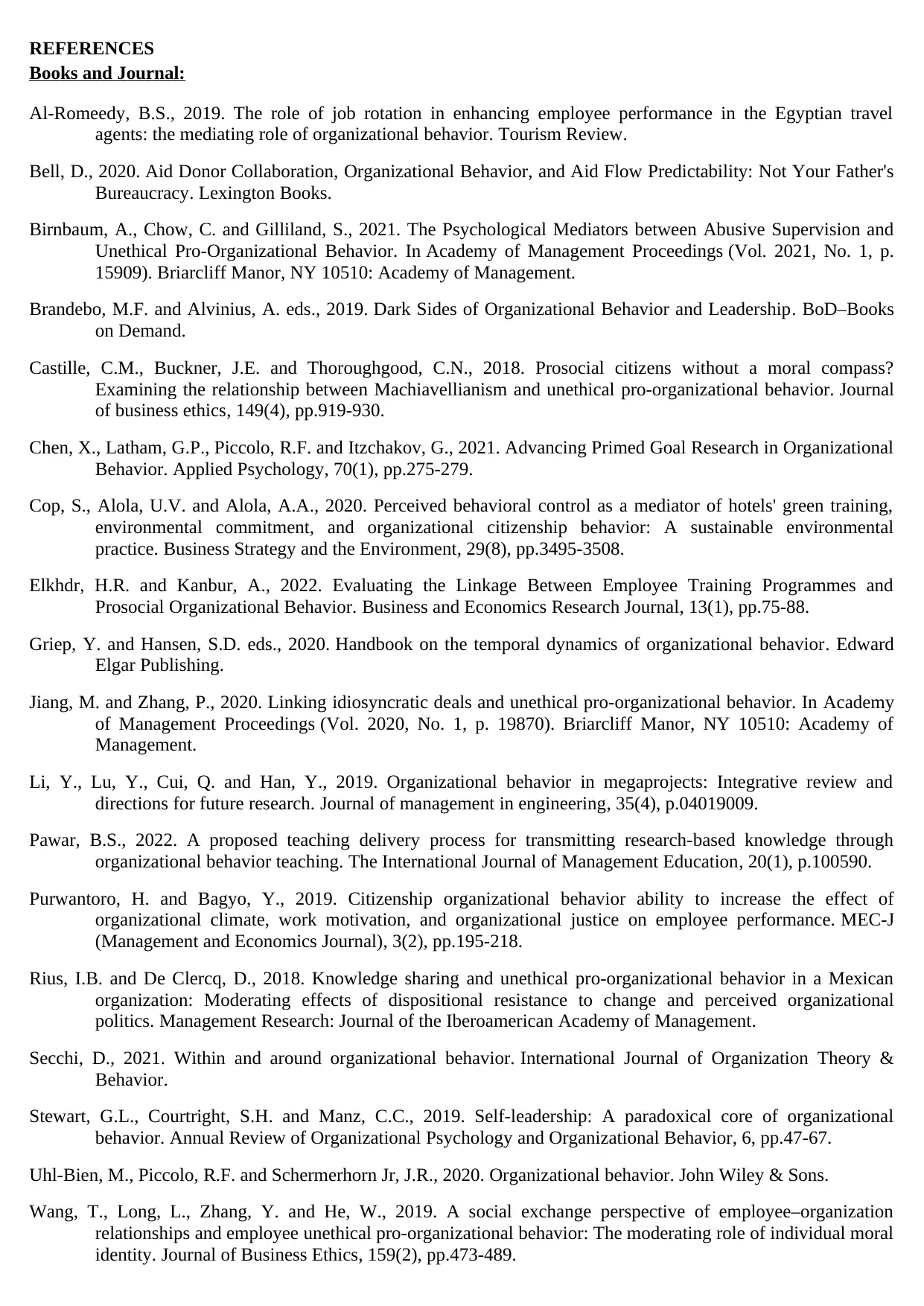
REFERENCES
Books and Journal:
Al-Romeedy, B.S., 2019. The role of job rotation in enhancing employee performance in the Egyptian travel
agents: the mediating role of organizational behavior. Tourism Review.
Bell, D., 2020. Aid Donor Collaboration, Organizational Behavior, and Aid Flow Predictability: Not Your Father's
Bureaucracy. Lexington Books.
Birnbaum, A., Chow, C. and Gilliland, S., 2021. The Psychological Mediators between Abusive Supervision and
Unethical Pro-Organizational Behavior. In Academy of Management Proceedings (Vol. 2021, No. 1, p.
15909). Briarcliff Manor, NY 10510: Academy of Management.
Brandebo, M.F. and Alvinius, A. eds., 2019. Dark Sides of Organizational Behavior and Leadership. BoD–Books
on Demand.
Castille, C.M., Buckner, J.E. and Thoroughgood, C.N., 2018. Prosocial citizens without a moral compass?
Examining the relationship between Machiavellianism and unethical pro-organizational behavior. Journal
of business ethics, 149(4), pp.919-930.
Chen, X., Latham, G.P., Piccolo, R.F. and Itzchakov, G., 2021. Advancing Primed Goal Research in Organizational
Behavior. Applied Psychology, 70(1), pp.275-279.
Cop, S., Alola, U.V. and Alola, A.A., 2020. Perceived behavioral control as a mediator of hotels' green training,
environmental commitment, and organizational citizenship behavior: A sustainable environmental
practice. Business Strategy and the Environment, 29(8), pp.3495-3508.
Elkhdr, H.R. and Kanbur, A., 2022. Evaluating the Linkage Between Employee Training Programmes and
Prosocial Organizational Behavior. Business and Economics Research Journal, 13(1), pp.75-88.
Griep, Y. and Hansen, S.D. eds., 2020. Handbook on the temporal dynamics of organizational behavior. Edward
Elgar Publishing.
Jiang, M. and Zhang, P., 2020. Linking idiosyncratic deals and unethical pro-organizational behavior. In Academy
of Management Proceedings (Vol. 2020, No. 1, p. 19870). Briarcliff Manor, NY 10510: Academy of
Management.
Li, Y., Lu, Y., Cui, Q. and Han, Y., 2019. Organizational behavior in megaprojects: Integrative review and
directions for future research. Journal of management in engineering, 35(4), p.04019009.
Pawar, B.S., 2022. A proposed teaching delivery process for transmitting research-based knowledge through
organizational behavior teaching. The International Journal of Management Education, 20(1), p.100590.
Purwantoro, H. and Bagyo, Y., 2019. Citizenship organizational behavior ability to increase the effect of
organizational climate, work motivation, and organizational justice on employee performance. MEC-J
(Management and Economics Journal), 3(2), pp.195-218.
Rius, I.B. and De Clercq, D., 2018. Knowledge sharing and unethical pro-organizational behavior in a Mexican
organization: Moderating effects of dispositional resistance to change and perceived organizational
politics. Management Research: Journal of the Iberoamerican Academy of Management.
Secchi, D., 2021. Within and around organizational behavior. International Journal of Organization Theory &
Behavior.
Stewart, G.L., Courtright, S.H. and Manz, C.C., 2019. Self-leadership: A paradoxical core of organizational
behavior. Annual Review of Organizational Psychology and Organizational Behavior, 6, pp.47-67.
Uhl-Bien, M., Piccolo, R.F. and Schermerhorn Jr, J.R., 2020. Organizational behavior. John Wiley & Sons.
Wang, T., Long, L., Zhang, Y. and He, W., 2019. A social exchange perspective of employee–organization
relationships and employee unethical pro-organizational behavior: The moderating role of individual moral
identity. Journal of Business Ethics, 159(2), pp.473-489.
Books and Journal:
Al-Romeedy, B.S., 2019. The role of job rotation in enhancing employee performance in the Egyptian travel
agents: the mediating role of organizational behavior. Tourism Review.
Bell, D., 2020. Aid Donor Collaboration, Organizational Behavior, and Aid Flow Predictability: Not Your Father's
Bureaucracy. Lexington Books.
Birnbaum, A., Chow, C. and Gilliland, S., 2021. The Psychological Mediators between Abusive Supervision and
Unethical Pro-Organizational Behavior. In Academy of Management Proceedings (Vol. 2021, No. 1, p.
15909). Briarcliff Manor, NY 10510: Academy of Management.
Brandebo, M.F. and Alvinius, A. eds., 2019. Dark Sides of Organizational Behavior and Leadership. BoD–Books
on Demand.
Castille, C.M., Buckner, J.E. and Thoroughgood, C.N., 2018. Prosocial citizens without a moral compass?
Examining the relationship between Machiavellianism and unethical pro-organizational behavior. Journal
of business ethics, 149(4), pp.919-930.
Chen, X., Latham, G.P., Piccolo, R.F. and Itzchakov, G., 2021. Advancing Primed Goal Research in Organizational
Behavior. Applied Psychology, 70(1), pp.275-279.
Cop, S., Alola, U.V. and Alola, A.A., 2020. Perceived behavioral control as a mediator of hotels' green training,
environmental commitment, and organizational citizenship behavior: A sustainable environmental
practice. Business Strategy and the Environment, 29(8), pp.3495-3508.
Elkhdr, H.R. and Kanbur, A., 2022. Evaluating the Linkage Between Employee Training Programmes and
Prosocial Organizational Behavior. Business and Economics Research Journal, 13(1), pp.75-88.
Griep, Y. and Hansen, S.D. eds., 2020. Handbook on the temporal dynamics of organizational behavior. Edward
Elgar Publishing.
Jiang, M. and Zhang, P., 2020. Linking idiosyncratic deals and unethical pro-organizational behavior. In Academy
of Management Proceedings (Vol. 2020, No. 1, p. 19870). Briarcliff Manor, NY 10510: Academy of
Management.
Li, Y., Lu, Y., Cui, Q. and Han, Y., 2019. Organizational behavior in megaprojects: Integrative review and
directions for future research. Journal of management in engineering, 35(4), p.04019009.
Pawar, B.S., 2022. A proposed teaching delivery process for transmitting research-based knowledge through
organizational behavior teaching. The International Journal of Management Education, 20(1), p.100590.
Purwantoro, H. and Bagyo, Y., 2019. Citizenship organizational behavior ability to increase the effect of
organizational climate, work motivation, and organizational justice on employee performance. MEC-J
(Management and Economics Journal), 3(2), pp.195-218.
Rius, I.B. and De Clercq, D., 2018. Knowledge sharing and unethical pro-organizational behavior in a Mexican
organization: Moderating effects of dispositional resistance to change and perceived organizational
politics. Management Research: Journal of the Iberoamerican Academy of Management.
Secchi, D., 2021. Within and around organizational behavior. International Journal of Organization Theory &
Behavior.
Stewart, G.L., Courtright, S.H. and Manz, C.C., 2019. Self-leadership: A paradoxical core of organizational
behavior. Annual Review of Organizational Psychology and Organizational Behavior, 6, pp.47-67.
Uhl-Bien, M., Piccolo, R.F. and Schermerhorn Jr, J.R., 2020. Organizational behavior. John Wiley & Sons.
Wang, T., Long, L., Zhang, Y. and He, W., 2019. A social exchange perspective of employee–organization
relationships and employee unethical pro-organizational behavior: The moderating role of individual moral
identity. Journal of Business Ethics, 159(2), pp.473-489.

⊘ This is a preview!⊘
Do you want full access?
Subscribe today to unlock all pages.

Trusted by 1+ million students worldwide
1 out of 12
Related Documents
Your All-in-One AI-Powered Toolkit for Academic Success.
+13062052269
info@desklib.com
Available 24*7 on WhatsApp / Email
![[object Object]](/_next/static/media/star-bottom.7253800d.svg)
Unlock your academic potential
Copyright © 2020–2026 A2Z Services. All Rights Reserved. Developed and managed by ZUCOL.



